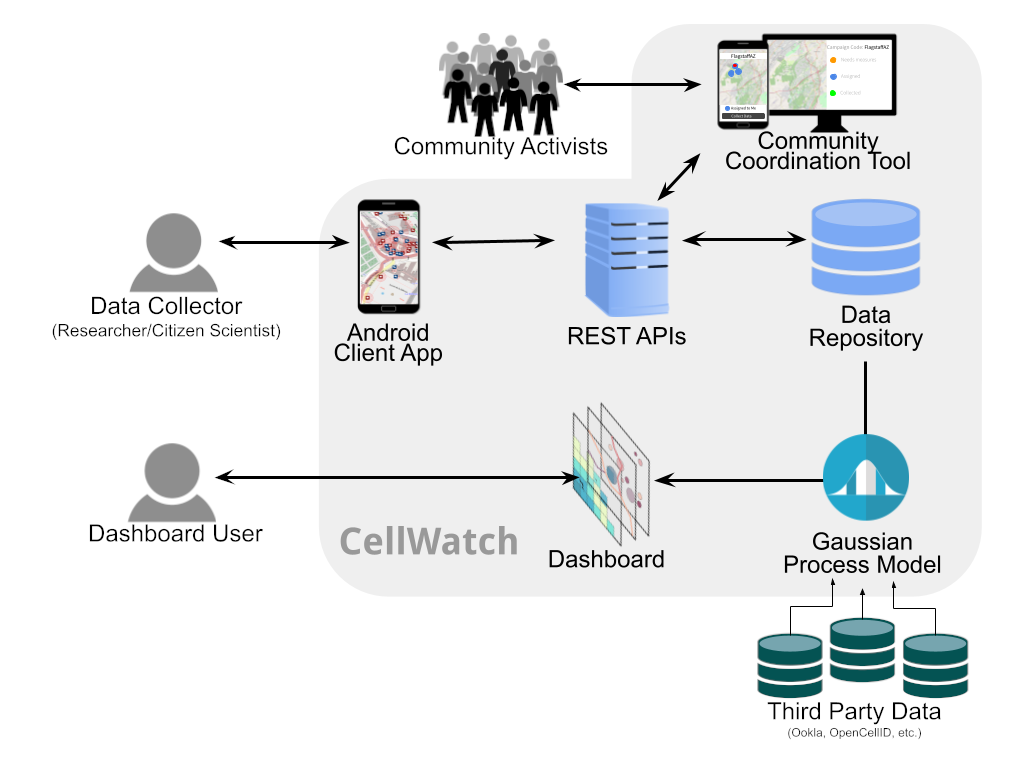Projects
 An open-source cellular network measurement suite created in collaboration with researchers at UC Santa Barbara and Northern Arizona University. The suite includes an Android app capable of taking speed test measurements that comply with the FCC’s requirements for challenging providers’ coverage claims; a data portal allowing public access to aggregate, anonymous data collected by the app; a community coordination tool to help communities organize measurement campaigns; and a prediction engine capable of synthesizing multiple datasets to predict quality of coverage in a given area.
An open-source cellular network measurement suite created in collaboration with researchers at UC Santa Barbara and Northern Arizona University. The suite includes an Android app capable of taking speed test measurements that comply with the FCC’s requirements for challenging providers’ coverage claims; a data portal allowing public access to aggregate, anonymous data collected by the app; a community coordination tool to help communities organize measurement campaigns; and a prediction engine capable of synthesizing multiple datasets to predict quality of coverage in a given area. The Computing and Society Lab began working with the Colombian Embassy in January 2023 to understand the quality and key determinants of Internet access in Colombia. The team is working to meet the embassy’s request for recommendations and tradeoffs of various technologies, funding structures, and social drivers of Internet adoption to inform national policy. This project will initially focus on the Bajo Cauca, Nariño/Tumaco, and Catatumbo regions, and research questions are being actively discussed.
The Computing and Society Lab began working with the Colombian Embassy in January 2023 to understand the quality and key determinants of Internet access in Colombia. The team is working to meet the embassy’s request for recommendations and tradeoffs of various technologies, funding structures, and social drivers of Internet adoption to inform national policy. This project will initially focus on the Bajo Cauca, Nariño/Tumaco, and Catatumbo regions, and research questions are being actively discussed. We study computing ethics education, primarily at the undergraduate level. We are working to better understand when, why, and how ethics is taught at the undergraduate level, how to improve the teaching of ethics, and the impact teaching ethics has on students as they enter the workforce.
We study computing ethics education, primarily at the undergraduate level. We are working to better understand when, why, and how ethics is taught at the undergraduate level, how to improve the teaching of ethics, and the impact teaching ethics has on students as they enter the workforce. Our lab has worked closely with Four rural, underserved communties south of Atlanta researching and studying their Wireless ISP (WISP) deployments. These communities - Concord, Woodbury, Spalding, and Pike - have had to resort to creating their own internet service provider to provide last-mile connectivity to their residents due to big telecom companies not seeing them as a profitable venture. We created a Dashboard and testing system with Raspbery Pis to visualize performance across their networks to better inform expansion efforts.
Our lab has worked closely with Four rural, underserved communties south of Atlanta researching and studying their Wireless ISP (WISP) deployments. These communities - Concord, Woodbury, Spalding, and Pike - have had to resort to creating their own internet service provider to provide last-mile connectivity to their residents due to big telecom companies not seeing them as a profitable venture. We created a Dashboard and testing system with Raspbery Pis to visualize performance across their networks to better inform expansion efforts.
